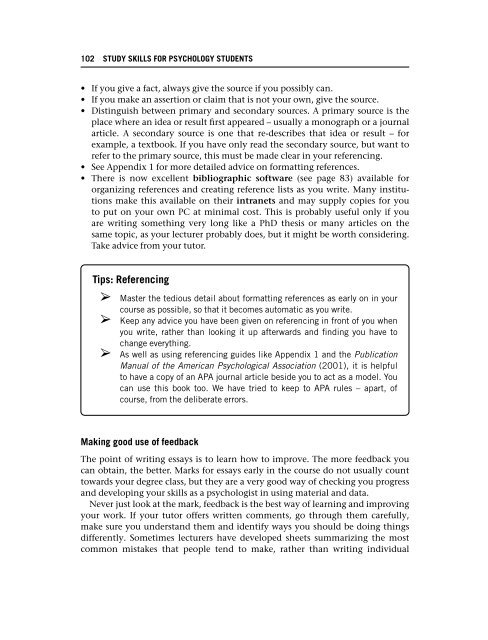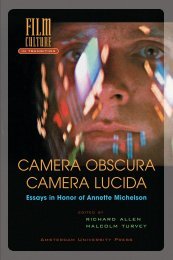Psychology - Forgot your username
Psychology - Forgot your username
Psychology - Forgot your username
You also want an ePaper? Increase the reach of your titles
YUMPU automatically turns print PDFs into web optimized ePapers that Google loves.
102 STUDY SKILLS FOR PSYCHOLOGY STUDENTS<br />
• If you give a fact, always give the source if you possibly can.<br />
• If you make an assertion or claim that is not <strong>your</strong> own, give the source.<br />
• Distinguish between primary and secondary sources. A primary source is the<br />
place where an idea or result first appeared – usually a monograph or a journal<br />
article. A secondary source is one that re-describes that idea or result – for<br />
example, a textbook. If you have only read the secondary source, but want to<br />
refer to the primary source, this must be made clear in <strong>your</strong> referencing.<br />
• See Appendix 1 for more detailed advice on formatting references.<br />
• There is now excellent bibliographic software (see page 83) available for<br />
organizing references and creating reference lists as you write. Many institutions<br />
make this available on their intranets and may supply copies for you<br />
to put on <strong>your</strong> own PC at minimal cost. This is probably useful only if you<br />
are writing something very long like a PhD thesis or many articles on the<br />
same topic, as <strong>your</strong> lecturer probably does, but it might be worth considering.<br />
Take advice from <strong>your</strong> tutor.<br />
Tips: Referencing<br />
➢ Master the tedious detail about formatting references as early on in <strong>your</strong><br />
course as possible, so that it becomes automatic as you write.<br />
➢ Keep any advice you have been given on referencing in front of you when<br />
you write, rather than looking it up afterwards and finding you have to<br />
change everything.<br />
➢ As well as using referencing guides like Appendix 1 and the Publication<br />
Manual of the American Psychological Association (2001), it is helpful<br />
to have a copy of an APA journal article beside you to act as a model. You<br />
can use this book too. We have tried to keep to APA rules – apart, of<br />
course, from the deliberate errors.<br />
Making good use of feedback<br />
The point of writing essays is to learn how to improve. The more feedback you<br />
can obtain, the better. Marks for essays early in the course do not usually count<br />
towards <strong>your</strong> degree class, but they are a very good way of checking you progress<br />
and developing <strong>your</strong> skills as a psychologist in using material and data.<br />
Never just look at the mark, feedback is the best way of learning and improving<br />
<strong>your</strong> work. If <strong>your</strong> tutor offers written comments, go through them carefully,<br />
make sure you understand them and identify ways you should be doing things<br />
differently. Sometimes lecturers have developed sheets summarizing the most<br />
common mistakes that people tend to make, rather than writing individual






